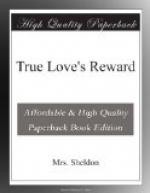“What proofs do I need?” she asked, in a voice that was not quite steady.
“The marriage certificate of the contracting parties, or some witness of the ceremony, besides some reliable person who can identify you as their child,” was the business-like response.
“Then I can prove nothing,” Mona said, in a weary tone, “for I have no certificate, no letters, not even a scrap of writing penned by either my father or my mother.”
A peculiar expression swept over Mr. Corbin’s face at this statement, and Mona caught sight of it.
“What could it mean?” she asked herself, with a flash of anger that was quite foreign to her amiable disposition. “Did the man imagine her to be an impostor, or did he suspect that there might have been no legal bond between her parents?”
This latter thought made her tingle to her fingertips, and aroused all her proud spirit.
“I can at least prove that I am Walter Dinsmore’s niece,” she added, lifting her head with a haughty air, while her thoughts turned to Mr. Graves, her uncle’s lawyer. He at least knew and could testify to the fact. “He took me,” she continued, “three days after mother’s death, and I lived with him from that time until he died.”
“Ah! and your mother was Mr. Dinsmore’s sister?” questioned Mr. Corbin.
“Yes. I always supposed, until within a few days, that she was his own sister,” Mona said, thinking it best to be perfectly open in her dealings with the lawyer; “that her name was Mona Dinsmore; but only this week I learned that it was Mona Forester, so, of course, she must have been a half-sister.”
“Well, if you can prove what you have stated it may lead to further developments,” said Mr. Corbin, kindly. “Let me examine your proofs, and then I shall know what to do next.”
A sudden fear smote Mona—a great shock made her heart almost cease its beating at the lawyer’s request.
What proofs had she for him to examine? How could she establish the absolute fact?
It was true that her uncle had authorized a will to be made leaving all his property to his “beloved niece,” but he had not been able to sign it, and it of course amounted to nothing. Must even this relationship be denied her in law? Oh, why had he not been more careful in regard to her interests? It was very hard—it was very humiliating to have her identity thus doubted.
“Mr. Horace Graves was my uncle’s lawyer; he will tell you that I am his niece,” she faltered, with white lips.
“My dear young lady, I know Mr. Graves, and that he is a reliable man,” Mr. Corbin observed; “but a hundred people might assert that you were Mr. Dinsmore’s niece, and it would not prove anything. Don’t you know that to satisfy the law upon any point there must be indisputable proof forthcoming; there must be some written record—something tangible to demonstrate it, or it amounts to nothing? You may be the niece of Mr. Dinsmore; you may be the daughter of Mr. and Mrs. Richmond Montague; this may be the portrait of Miss Mona Forester; but the facts would have to be established before your claim could be recognized and the property bequeathed to Miss Forester made over to you.”




